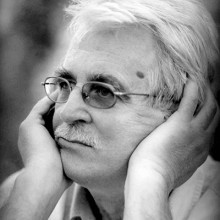Polish literature

Krystian Lupa
Born in 1943, a theater director, stage designer, teacher, primarily affiliated with the Stary Theater in Krakow, and a prose writer; he has created plays that were splendidly received by audiences and critics alike, stage adaptations of great literary works, such as those by Robert Musil, Hermann Broch or Fyodor Dostoyevsky; for the purposes of his performances he translates the works of German-language writers; he has published a translation of Rilke’s The Story of a Darkness Told (2000); he himself has written Utopia and Its Inhabitants (1994), including texts on theater; as a prose writer he made his debut with Labyrinth (2001), then later published a volume entitled Spying (2003); he has been nominated for the NIKE Literary Award for his prose.
Krystian Lupa’s books of prose are made up of notes that come together to make whole fictions, culled from the diaries the famous director has been writing for years. In Labyrinth the author mainly orbits around the theme of childhood. The opening chapters of Spying are similar, though in subsequent parts of the book he leaves the land of his childhood years. Spying is decidedly more diverse than his debut, there are more themes and figures that emerge. The writer focuses on his friends and acquaintances, and on people he does not know, whom he has observed on the street. And yet he describes the world and others in order to know and present himself better.
Lupa has long been fascinated by modernist literature, which is reflected in his theatrical work. This fascination has also found its expression in the prose of the author of Labyrinth. Lupa’s subject matter is highly modernist, writing on the intersections between physicality and spirituality, life and death (or: youth and old age), and about metaphysics and art. He provides a portrait of the artist’s life that tingles with emotion. And this is a modernist artist, as we can see from the very type of narrative itself, full of twisted and fragmented sentences that end in ellipses. Lupa’s prose takes the form of hasty, often clearly anxious notes, as if trying to pursue a fleeting thought. For here the writer grapples with the inexpressible (or nearly so), in the great modernist tradition.
BIBLIOGRAPHY
- Labirynt, Warszawa: W.A.B., 2001.
- Podglądania, Warszawa: W.A.B., 2003.